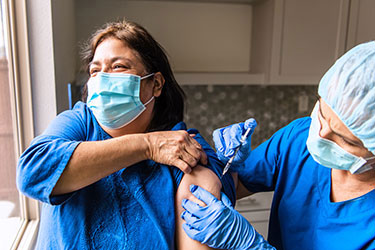Friday’s National Public Health Week theme is “Building COVID-19 Resilience.” For individuals, that means continuing to wear masks in public, avoiding crowds and getting a vaccination when it’s available. For public health, it means strengthening the systems that have been devastated by the pandemic.
Carlos del Rio, MD, a professor of medicine, epidemiology and global health at Emory University, is one of the nation’s leading advisors on COVID-19. Del Rio discusses how we can remain resilient in the face of COVID-19 variants and barriers to getting everyone vaccinated.
How can communities inspire people to continue safety protocols?
I think it’s really important that we remind people that we’re not quite there yet. As we get people vaccinated, we’re really in a race between the virus, variants and the vaccines. We have to get people vaccinated quickly, but in the meantime, we need to continue wearing a mask, physically distance and, most importantly, avoid crowded environments.
importantly, avoid crowded environments.
I am very concerned that various states are lifting restrictions too soon and people are pretty much giving up. I know everybody is tired, but it is time not to give up. We’re very close to where we need to be. Please continue doing the right thing.
In what ways can communities build trust for science and public health, given the vast amount of misinformation out there?
We as the public health community can build trust in science and public health. We need to do it by messaging frequently to individuals and others what’s important, what the messages are and how do we better translate science into messages that communities and people can understand.
What can we do to ensure that communities of color and other vulnerable people have equitable access to COVID-19 vaccines?
Herd immunity is going to be critical to get us to a new normal. But we need to do everything we can to also vaccinate those that have become harder to vaccinate — those that we call “hesitant.” So not only communities of color, but also rural communities and Republicans. The highest hesitancy rate is seen among Latinx (people).
We need to work with communities, because until everybody is immune, nobody’s safe. Getting people vaccinated has to be a priority.
How can people do their part to stop COVID-19 variants?
The most important way to stop variants and to stop mutations is to stop virus transmission.
By wearing our mask, by physically distancing we’re immediately cutting down the transmission of the virus, and therefore we’re cutting down on the possibility of creating new ones. But we also need to assure people that giving vaccines works, and works also against the mutations that we currently are seeing.
Getting vaccinated is the surest way to prevent the emergence of co-variants that could potentially spread faster in our country.
What are ways we can overcome vaccine hesitancy?
We need to listen more than talk. We need to ask people what questions they have. We need to answer their questions. But we also need to tell people the benefit of vaccination. And to me, a major benefit is to be able to get together with your family, to be able to get together with your loved ones, to be able to get together and hug each other and spend time with each other and do the things that throughout this past year we have missed. I think everybody wants to do that. And that to me is one of the most positive reasons to get vaccinated.
For more information on constructing COVID-19 resilience, visit the NPHW website. Want to get moving in a physically distant way? Check out the NPHW website for free Zumba and yoga classes this weekend.
This interview was edited and condensed.
Watch and share: NPHW message from Carlos del Rio
(Photo by Juanmonino, courtesy iStockphoto)